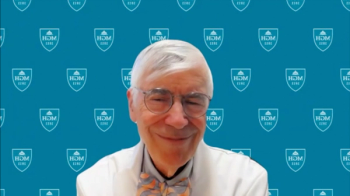
Clinical
Latest News

Latest Videos
CME Content
More News

An expert discusses how the phase 3 LUNA 3 trial demonstrated that rilzabrutinib achieved durable platelet responses in 23% of patients while also being the first prospective trial to show significant improvements across all quality-of-life metrics.

Surgeons are more likely to perform opportunistic salpingectomy when their peers have done so, underscoring the impact of physician networks in ovarian cancer prevention.

Efgartigimod shows promising efficacy over IV immunoglobulin in treating impending myasthenic crisis in patients with myasthenia gravis.

US pediatric influenza-associated encephalopathy (IAE) cases surged during the 2024-2025 season, highlighting severe health risks and the need for better surveillance.

A retrospective multicenter study found that patients with heart failure discharged by noon had higher short- and long-term mortality and increased early readmission rates compared with afternoon discharges.

Artificial intelligence (AI) is expanding clinical trial access and enabling drug repurposing, according to Vivek Subbiah, MD.

Patients with chronic kidney disease (CKD) stages 3b or 4 experienced slower decline in estimated glomerular filtration rate 20 months after enrollment in a value-based kidney care program.

Aumolertinib was compared against osimertinib to demonstrate its efficacy in those with mutated non-small cell lung cancer (NSCLC).

Rilzabrutinib (Wayrilz; Sanofi) may improve immune thrombocytopenia (ITP) outcomes, enable early intervention, and enhance patient quality of life.

Scott Soefje, PharmD, MBA, BCOP, discusses how remote patient monitoring and caregiver support enable safe outpatient delivery of bispecific antibodies and antibody-drug conjugates.

Panelists discuss how prescription digital therapeutics can serve the psychological and social components of schizophrenia treatment while potentially improving medication adherence, similar to how digital monitoring tools enhance outcomes in other chronic conditions like diabetes and hypertension.

Panelists discuss how the global shortage of psychiatrists contributes to patient burden by necessitating expanded training for other health care professionals, including nurse practitioners, physician assistants, primary care doctors, and law enforcement to recognize and manage schizophrenia symptoms.

Panelists discuss how negative symptoms create significant patient burden by appearing during the prodromal period in late adolescence and requiring a comprehensive biopsychosocial treatment approach that addresses biological, psychological, and social aspects of care.

Panelists discuss how the greatest unmet needs include addressing poor outcomes in specific subsets like TP53-mutant disease, managing the increasingly older population with secondary mutations, and ensuring global access to targeted therapies and next-generation sequencing.

Panelists discuss how fitness assessment has evolved beyond traditional age cutoffs to incorporate comprehensive geriatric assessments, frailty measures, and individualized evaluations, while questioning whether intensive therapy should automatically be given to fit patients given newer effective treatment options.

Three researchers received the 2025 Nobel Prize in Physiology or Medicine for discovering regulatory T cells and the Foxp3 gene, which revealed how the immune system prevents autoimmune disease.

Panelists discuss how heart failure classification involves HFrEF vs HFpEF distinctions and staging systems (A through D), with the greatest prevention opportunities existing in early stages A and B, where patients have risk factors or subclinical dysfunction but haven’t yet developed overt clinical symptoms.

Panelists discuss how quality metrics should focus on keeping patients out of hospitals through core medical therapies, measuring all-cause hospitalizations and days spent at home in the community, while tracking both process metrics (guideline-directed medical therapy prescriptions, comorbidity management) and outcome metrics (mortality, readmissions, quality of life) with financial incentives through Medicare Accountable Care Organization programs.

FDA approvals since the last Skin of Color Update expand topical and biologic options for various dermatological conditions, benefiting patients with skin of color.

Stronger partnerships between primary care and oncology improve patient outcomes by ensuring coordinated care and addressing financial and systemic barriers, says Mark Fendrick, MD.

Reducing data silos and boosting transparency in oncology requires payer-provider trust and co-governance, according to Vishnukamal Golla, MD, MPH.

Colon cancer recurrence risk falls below 0.5% at 6 years post-surgery, offering a practical benchmark for defining cure, according to new research.

An expert discusses how current immune thrombocytopenia (ITP) treatments such as corticosteroids, rituximab, and fostamatinib have significant tolerability issues and fail to provide sustained platelet responses or address quality-of-life concerns.

An expert discusses how rilzabrutinib, a recently FDA-approved Bruton tyrosine kinase (BTK) inhibitor, targets the autoimmune pathophysiology of immune thrombocytopenia (ITP) by modulating B cells, macrophages, and reducing pro-inflammatory cytokines.

Vivek Subbiah, MD, considers artificial intelligence (AI) and comprehensive somatic and germline testing essential for guiding precision oncology and improving patient care.














